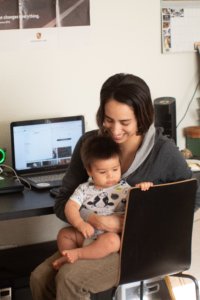Since 2015, Tony Hayes has been driving the digital transformation agenda at Arrows Group Global.
In the third of our ‘Who We Are’ series, join as we talk in-depth on topics including data as the heartbeat of the industry, what it takes to digitally transform and advice for those looking to start out in the sector.
–
Welcome, Tony. Can you tell us a bit about your background and the path that has taken your role as Tech Director at Arrows Group Global?
I landed in recruitment at the end of the 00’s. My first roles involved delivering CRM solutions for staffing businesses and that was quite timely. We were starting to see a proliferation of Software as a Service (SaaS), with online CRM systems starting to replace more traditional on-premise databases. This change started opening the recruitment industry to adopting more technology in the digital space.
I worked for several businesses, either as an employee or as a consultant. In 2015, I was approached by Arrows to take ownership of their technology roadmap. Arrows was an early adopter of technology. They were already thinking about how to improve productivity and effectiveness through a richer understanding of data and business insights and that mindset really motivated me to join.
My mandate has changed alongside the presence of technology within the industry. Now, in my role, I look to identify the right technology and make sure it’s fully adopted, a valuable investment, and that it supports colleagues to achieve productivity levels that would be impossible without it.
With the pace of change of technology, how has your role evolved?
In the early days of my career, it was quite difficult to convince teams to adopt technology. Tech spend was often viewed as a necessary evil, with companies preferring to invest in sales capabilities. Going back to c. 2010, there was a fair amount of suspicion about the role of technology within recruitment! The industry wasn’t yet mature enough to articulate the justification for it; people didn’t know what it should look like or how to optimize it.
Over the last decade, technology has become completely embedded in the productivity of any business. New technology has emerged that has transcended general activity tracking. What we’ve all been through in the last two years and the reliance on digital services has also had a huge impact.
The recruitment industry has been preparing for our current phase of digital transformation, where data is the heartbeat, since 2018/19. Deploying the ecosystem and harnessing the capabilities of AI, machine learning and automation. That’s the trinity.
The role someone like myself plays within industry today is a million miles away from that necessary evil of ten years ago, which is quite satisfying! Most importantly, it’s now clear to see the impact digital transformation can have from the desk level up for businesses, employing a little bit of science into the art of recruitment.
“ … it’s now clear to see the impact digital transformation can have from the desk level up for businesses, employing a little bit of science into the art of recruitment.”
It’s clear you are an advocate for the power of digital transformation in the recruitment space. How do technology advancements create benefits for recruitment companies, their clients and candidates?
It’s a huge question, but I’ll try to unpack it!
I’m not advocating as a type of crusade. But, taking a step back, the recruitment space is probably one of the final enterprise-level industries that hasn’t completely adopted digital transformation. If you look at retail space, travel, accommodation. for example, they’ve been completely digitally transformed.
For clients, we’re talking about market differentiators. Companies need to be able to operate efficiently, get access to talent quicker and optimize their recruitment experience. They come to companies such as Arrows to achieve that, as we have developed a digital product offering that is an enjoyable experience to be involved in and produces long-standing results.
For Arrows Group, because we operate within the tech recruitment space, digital transformation means we subscribe to the same principles our clients work to. It’s a more harmonious relationship.
For candidates, convenience is important and digital transformation supports that. They can enjoy a better experience because they have more consistent, richer relationships with a smaller number of people. They can be in contact with us at a time that’s more convenient to them and be presented with more relevant opportunities.
For Arrows, our consultants are liberated from the more traditional admin duties of a non-digitally transformed environment. This gives them the opportunity to be more consultative, spending more time talking to candidates or clients.
The impact for company stakeholders / shareholders is also considerable. If you execute tech correctly, you should expect around 10 times the return on your people investment. So, digital transformation is not just about technology. It’s about people, process and data and harnessing the potential of those components.
It’s interesting that you talk about tech liberating deeper human relationships. You seem to be describing technology as supporting better relationships, not removing the personal element.
This is where the data, people and process elements come in. Simply deploying technology is not going to make you successful overnight. But, by understanding what digital transformation is trying to achieve, which is to enrich the experience of candidates, clients and companies to devote more time to what we’re truly unique at doing, it serves everybody to create a pleasant and productive experience.
“Simply deploying technology is not going to make you successful overnight.”
To what extent has the availability of universal data sources, starting with something like LinkedIn, been a driver for recruitment companies to improve data efficiency and tools?
In the early 2010’s, there was a real drive and grab for data in the industry – the more the better! To some degree, that’s still a challenge.
More mature technology-led businesses will understand why the highest-performing consultants don’t have 10,000 candidates or 3,000 clients. They’ve got a small, optimal network that is highly valuable. They manage, nurture and develop those networks really effectively, to ensure a world-class candidate and client experience.
There are so many different data sources now, the challenge isn’t the quantity but the quality of it. If you aren’t confident in the quality of your data, your entire digital transformation strategy is going to fall down. This is especially true when you progress towards AI and machine learning, which rely on, or assume, that the data they operate under is accurate.
Now for a change of direction – what are the most important things people should know about you?
I’m motivated to be a thought leader within the recruitment space. I’ve been supporting businesses with digital transformation through my entire career and want to be known as the guy to go to for advice, guidance, and support.
Prior to landing in the industry, I weaved an interesting web travelling the world as a DJ. That’s as much as I’ll share on that one for now!
Arrows Group describes itself as a technology-led recruitment company. Do you believe the recruitment company of the future will be as much a tech business as a recruiting business?
I’m inspired and motivated to work with a company / team who want to be known as a technology-led recruitment business. That really aligns with my values. Does that mean we’re the finished article? Absolutely not.
It’s not realistic for a business to say they’re perfect in terms of use and adoption of technology. The desire and strategic support, though, is unwavering. It’s on me to keep on driving the high expectations of the business to deliver the digital roadmap.
There are plenty of successful businesses that have barely even begun their transformation journey. Lots of industries rely on people, process and a whole lot of hard work. If they can be that successful without digital transformation, what might the extra benefits be with it?
What are some of the biggest barriers to implementing new technologies at scale?
Impatience and unrealistic timeframes. That comes back to someone like me giving the confidence that we can get a business to where it wants to be, but that it’s going to take time, money and perhaps some tears along the way!
If transformation is at scale, the foundations are even more significant. For Arrows, for example, this was about getting a best-in-class CRM and making sure the data in it was as clean as it could be. Then, from there, developing a data strategy and insights roadmap.
Once you become a data-led business, then you can truly become a technology-led business. You will have the capability to report, forecast and provide insights and a demographic willing to absorb and react to the information. If you try to do it all at once, the change challenge may be too much.
“Once you become a data-led business, then you can truly become a technology-led business.”
Subscription to this needs to be from the top down. Leaders need to be able to demonstrate that they too are adopting technology changes, and that their productivity is enhanced. It can’t be a question of do what I say, not what I do!
What’s in the Arrows Group Global Tech Stack? We’d love a tour …
We’re proud of our tech stack and quite transparent about it. So, by all means, take a look!
I’m always looking to satisfy strategic objectives from any of our tech partnerships. I always need to be confident there will be a worthwhile return.
Front and centre is our CMS system, Bullhorn. I’ve been collaborating with them for more than 10 years; the system is the sun around which the rest of our tech orbits. Circling this is world-class recruitment providers, who allow us to deliver a complete end-to-end experience.
A diamond in our crown is Cube19, through which we offer data insights and reporting analytics. We’ve partnered with them since 2018. Cube19 is pivotal to our day-to-day operations. Through it, we’ve advanced from traditional reporting to data-led decisions at every level of the business. We can perpetually challenge our data to give us clearer insights and efficiency gains for our teams and external partners alike.
Another partner is Sourcebreaker, a machine learning and AI search and lead generation tools. It’s fantastic for improving efficiency on delivery.
And I’ll also mention Herefish, which offers AI powered automation. Among the many, many things it supports is access to the right candidates at the right time, a better experience for contractors and it frees consultants from manual admin, allowing them to own their own marketing and brand.
Who or what is your biggest source of inspiration?
Professionally, inspiration comes for me when I see people who truly engage in and adopt digital transformation.
What advice would you give to any young people considering a career in data analytics / business intelligence?
Get in touch with me – we might have jobs going!
A good University level education will stand you in good stead, as will a natural appetite for data and analytics. There are opportunities to embrace and engage with data everywhere – you can follow the analytics around football games for example!
There are lots of communities, particularly on sites like LinkedIn, where people within the industry are happy to welcome you and talk on the topic. Feel free to reach out to me on LinkedIn for guidance on those or any other advice on the topic.
And finally, you’re a fan of endurance, obstacle events. What’s the toughest one you’ve tackled yet and what are your top tips for getting through them?
I’m a huge fan of cross-fit training and the community element of it. The toughest one by a mile was the London Marathon. The first half was a joy, and the second half was hell on earth! Hopefully I’ll have the opportunity to redress that battle again this year if I get a place again.
It’s the community element you get with these challenges I love, whether it’s training for them or the day itself. These events bring people together to achieve goals they’ve set out to do for a long time. There are parallels between that and the digital transformation journey, right?!
 Work life, parenting life, school life, sporting life, education. Everything that goes with being a mum has to be balanced with delivering top priority work.
Work life, parenting life, school life, sporting life, education. Everything that goes with being a mum has to be balanced with delivering top priority work.

 For Arrows Group, the Unibeez partnership allows unlimited early access to a vast pool of skilled and diverse student talent to their existing customers, helping them to bridge an ever-widening gap between education and entry level jobs in tech and data and giving them first mover advantage on Gen Z skills.
For Arrows Group, the Unibeez partnership allows unlimited early access to a vast pool of skilled and diverse student talent to their existing customers, helping them to bridge an ever-widening gap between education and entry level jobs in tech and data and giving them first mover advantage on Gen Z skills.